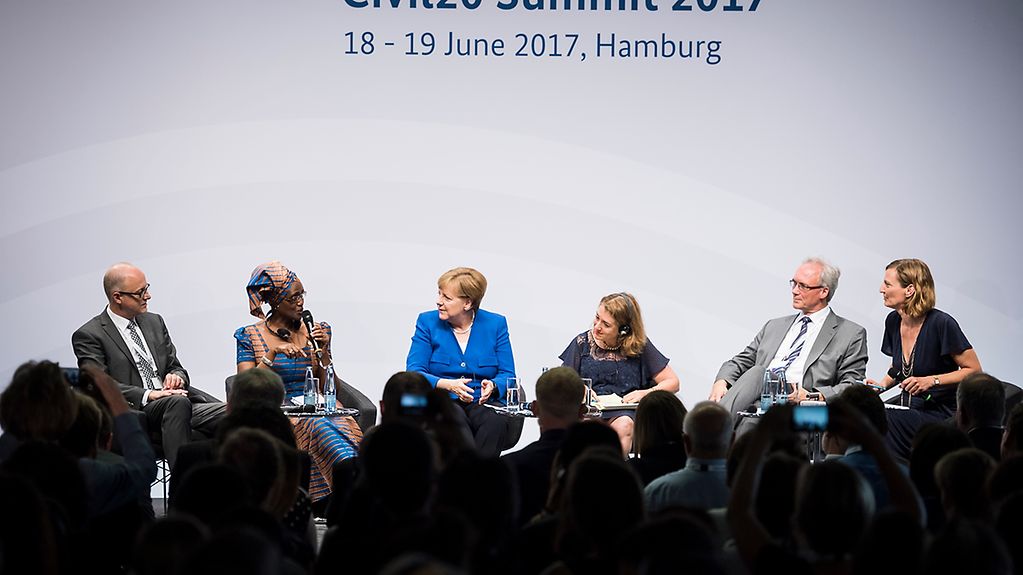Civil20 Dialogue Forum
On Monday international representatives of NGOs handed over their recommendations for shaping globalisation to the Federal Government. The Federal Chancellor thanked them for their hard work: "I believe that even in such difficult international times we have the chance to move forward if we work together."
3 min reading time

What now for globalisation? Chancellor Merkel discussed the question with NGO representatives in Hamburg
Photo: Bundesregierung/Kugler
A common approach was better than unilateral national action, and only a free civil society could maintain prosperity in the long term Chancellor Angela Merkel said in her speech at the C20 Dialogue Forum in Hamburg. Afterwards the NGOs handed the Chancellor their recommendations for shaping globalisation. These had been developed over the past few months in six international working groups.
Globalisation must benefit all
"Globalisation has to be a win-win situation for everyone," the Chancellor said. Germany was committed to using the G20 process to strengthen international cooperation.
One goal was to implement the Paris Climate Agreement, another to shape digitalisation while protecting privacy and safeguarding cyber security. The Chancellor told representatives from some 200 organisations and 50 countries that improving health systems was a matter of particular importance to her. She outlined those important topics which were to be addressed at the G20 Summit, saying that cooperation with Africa was another important priority area.
Taking civil society to the Summit
In the panel discussion which followed Chancellor Merkel listened to the demands and criticisms of the C20 participants. They warned that globalisation policy must not make the situation any worse. Social justice and environmental protection were two sides of the same coin. "It's not just a question of growth, it has to be about sustainability too," Ernest-Christoph Stolper from the German NGO Forum on Environment and Development said.
Winnie Byanyima from Oxford International highlighted the role of women in developing countries. She criticised the fact that the global economic model was based on the principle of injustice. That had to change, she said. Chancellor Merkel stressed that empowering women was a top priority for the German Government and one of the topics on the G20 agenda.
Angela Merkel thanked the NGOs for the constructive and critical dialogue. Nothing about globalisation was perfect, she said, but that was no reason to be discouraged. The answer was to take many small steps and to engage in dialogue.
Chancellor Merkel was joined in the discussion by representatives from the Association of German Development and Humanitarian Aid NGOs (VENRO), from Oxfam International, the German NGO Forum on Environment and Development, and Global Trade Watch.
C20 meets G20
The C20 meeting was the seventh and final dialogue event with civil society representatives in preparation for the G20 Summit in Hamburg. Prior to the C20 Summit dialogue forums had already taken place with scientists (Science20), women (Women20), business associations (Business20), trade unions (Labour20), think tanks (Think20) and young people (Youth20).
It was a matter of great concern to Chancellor Merkel that various civil society groups were involved. At the C20 Summit she said that the dialogues had delivered important input for the G20 process and that the recommendations made at the individual dialogue events had already been incorporated into that process.
G20 dialogue with civil society
The summit meeting of the Heads of State and Government of the G20 countries will take place in Hamburg on 7 and 8 July 2017. In the run-up to the Summit civil society representatives from various fields have been meeting to contribute their demands and proposals to the G20 process. They have been drawing up their policy recommendations for the G20 Summit in the context of dialogue forums. The German G20 Presidency regards this civil society engagement as independent of the state. Each respective group was responsible for defining the content of its own dialogue process.